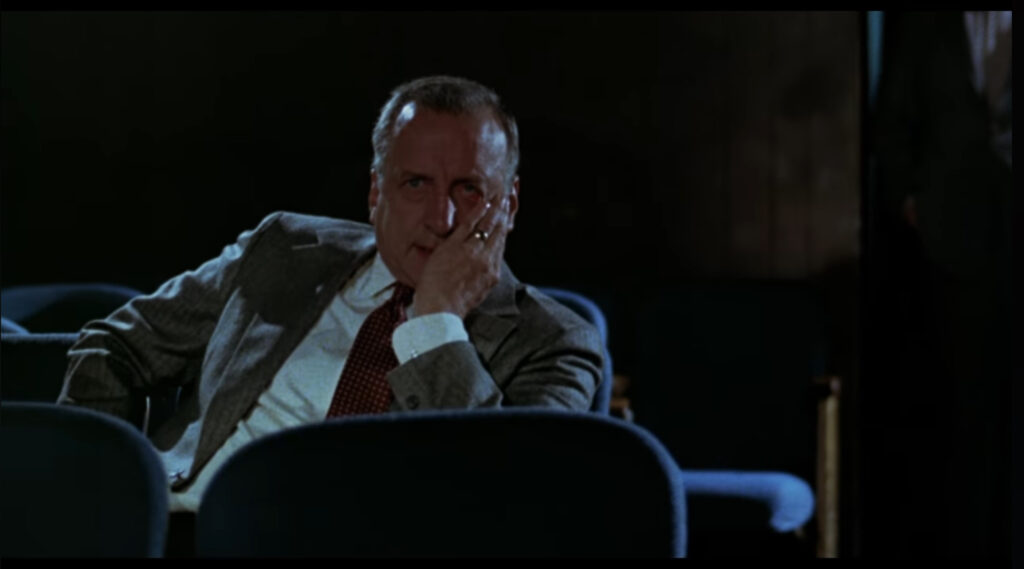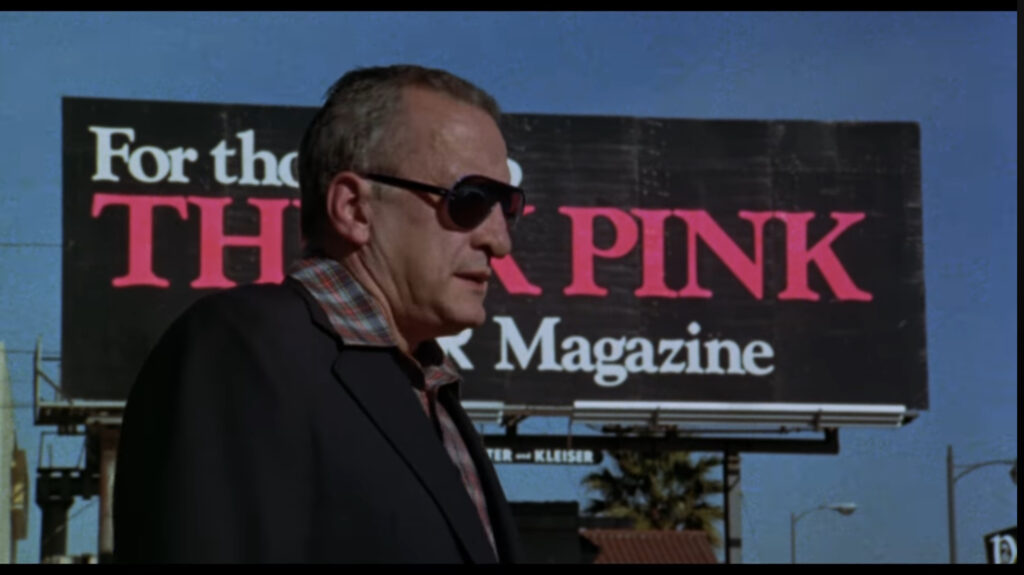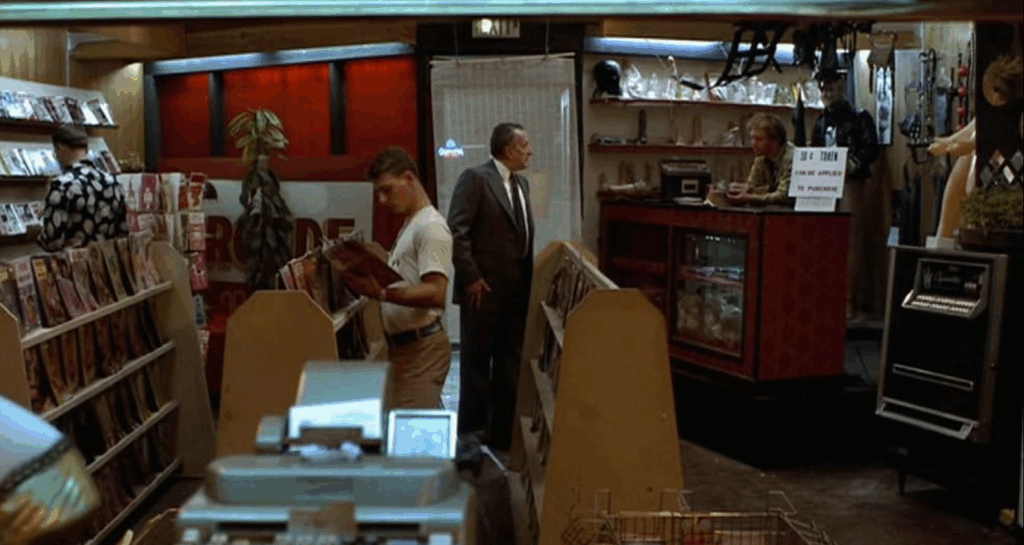| Sophie Durbin |

Hardcore plays at the Trylon Cinema from Sunday, May 11th, through Tuesday, May 13th. For tickets, showtimes, and other series information, visit trylon.org.
“You wanna hire a choir boy, you go back to Grand Rapids.” – Peter Boyle as Andy Mast, private detective
The opening credits of Paul Schrader’s Hardcore are set against a holiday scene in Grand Rapids, Michigan, filled with children sledding and snow-dusted corner churches. The first dialogue we hear is a snippet of a theological debate among men sitting at a coffee table. This is how we are introduced to Jake Van Dorn (George C. Scott), his family, and his faith in the Christian Reformed Church, a Calvinist Protestant denomination. Before the holiday meal, he jokes with the kids and then leads the table in solemn prayer: “Thou knowest our every need,” he begins, and he concludes by asking for God’s protection. In church, the pastor shares what the congregation should believe to be “their only comfort”: that “I, both in life and death, am not my own, but belong to my savior Jesus Christ.” The title sequence in Grand Rapids sets the scene for a film filled with Calvinist themes, which cast a peculiar sheen over the salacious plot. It is not a Calvinist film, but it is about a deeply Calvinist character, and its unique tragedy cannot hold the same weight without a solid understanding of a key Calvinist concept: predestination, which posits that God has already selected some people to save and some to be sentenced to eternal damnation.1 In the early medieval church, the concept of predestination existed—we can trace it to the earliest of theologians like Origen—but it gained a lot of momentum during the Reformation, as John Calvin’s elaboration on Martin Luther’s fury over the Catholic Church’s hypocrisy and excess. Predestination may seem to be a cruel or even nihilistic theory to contemporary heathen audiences, but consider it from Calvin’s perspective: no amount of “smells and bells,” of confession, of illicitly sold indulgences, can thwart decisions that God made when he created the universe.2

Toward the beginning of the film, Jake answers a phone call during a family dinner. The call lasts about 10 seconds. We don’t hear what Jake does, but when he comes back into the dining room, we can detect a shift in the air. His eyes are distant, lost in thought, and his steps are leaden. He sits down and shares, in a matter-of-fact tone, that his daughter Kristen has disappeared from her Christian Reformed Church youth group trip en route to the Youth Calvinist Convention. He isn’t in the process of accepting this possibly devastating news because he has already accepted it and chosen to act. In Calvinism, processing won’t do any good: your fate is not in your hands, and it’s best that you accept it. There is debate within Calvinist theological circles about whether God selects the predestined because he knows that they’re going to do “good works” in life, a concept known as “conditional election.” The more mysterious rival of conditional election is called “unconditional election,” and it’s when God selects the saved regardless of how they may someday conduct themselves. The former scenario offers individuals who live Christlike lives some hope that in doing so, they are living out a self-fulfilling prophecy. The latter requires the faithful to surrender their hopes for salvation entirely to God. If their path leads them toward destruction and damnation, so be it. We learn that Jake subscribes to the concept of unconditional election later in the film.3
Predestination works well with the classic noir formula in a sort of inverted fashion, in which the hapless protagonist is among those predestined to eternal damnation. The thrill of watching is in seeing him find his way to hell. But classic noirs are beholden to the expectation that bad deeds must be and will be punished, a truism that skirts around the inconvenient fact that fate is often cruel, illogical, and impersonal. Predestination becomes more interesting in a neo-noir context like Hardcore, where fate can really work its perverse magic. For example, Jake hires Andy Mast, a detective played memorably by Peter Boyle to track down his daughter in California. He seems like a fairly stand-up guy, as far as 70s film detectives go. He does good work, eventually ascertaining that Kristen has starred in at least one seedy stag film and, memorably, forcing Jake to watch it. Realizing what he’s seeing in the dark theatre, Jake begins to clasp his hands instinctively in prayer, as if to ask for forgiveness or redemption for Kristin—and then he cannot clasp them again. Radicalized, Jake returns to LA to join the search, and he finds Mast shacked up in a motel room with one of the “film stars” he was meant to be interrogating. This is among many faith-testing betrayals Jake faces in the film. Livid, Jake kicks him out of the apartment, which he has been bankrolling. Mast defends himself, albeit a little pathetically: “Hey, I’m only human. I’m not perfect.”
On his own, Jake now must contend with the reality of his daughter’s sordid situation which he always believed her strict upbringing may have prevented. When he finally does throw a punch in Kristen’s honor, it’s when her former co-star rants about her wild kinks, accusing her of being a “freaky bitch.” By throwing said punch, this might be the moment where Jake has accepted that the daughter he is chasing is not the one that he thought he raised. But continue chasing her he must. Eventually, he finds himself associating with the damned when he is joined by Niki, a peep show hostess and unlikely sidekick, who claims to be a member of an Aphrodite-worshipping goddess cult. The two get along. Jake has someone who can listen to him unconditionally (even to his monologues about Calvinist theology!) and Niki has a companion who will show her a little decency. After Jake finds Kristen, his tie with Niki must be cut, which to me is the real great tragedy of the film. “I wouldn’t expect too much about her coming back,” Niki warns Jake about Kristen, after sussing out that his wife (whose name, Joanne, is Kristen’s ironic stage name) is not dead, but left him and fled out east. “At least you get to go to heaven. I don’t get shit,” she says, casting herself among the damned.

Jake is told to “go back to Grand Rapids” so many times throughout Hardcore that the town itself becomes a stand-in for his conservatism and religious belief, which are the supposed antithesis of Los Angeles. He uses this to his advantage, hiding in plain sight, working his way into Kristen’s underworld by convincing everyone that he’s more naive than he is. This wears on him, but he cannot just leave. He knows he is meant to carry this search out to its completion. Eventually, when his cousin flies out from Michigan to give him a hand in his search, Jake is the one telling him to “go home.” His assumption is that he will return home, with Kristen in hand, when the time is right. But when Jake finally finds Kristen, she doesn’t ask to go home and she doesn’t tell him what he expected to hear. She explains that she chose to run away, and describes how isolated she felt in his rigid world, where she never felt that he truly loved her. Struggling to articulate why he never showed her the depth of his love, it’s now Jake’s turn to suspect that he may not be among those predestined for salvation: “It’s just my damnable pride.” He spots Niki in the crowd as he packs Kristen into a car and fumbles with his words trying to offer her some recompense. She doesn’t say anything and walks away, and her facial expression suggests that this is what she expected. Mast tells Jake to go home one last time. Everyone’s fate here has been predestined.
I first encountered Hardcore while nestled in my hotel room at a medieval studies conference in Kalamazoo, Michigan, and I was delighted when I realized that the film took place in Grand Rapids, which is just an hour north. Situated in the western part of the state heavily populated by Dutch immigrants, both Kalamazoo and Grand Rapids are part of the Western Michigan Calvinist Industrial Complex: the system of deep-cut beliefs that powers the DeVos family and Amway and the idea that whatever you get, you deserve. This is also the place of Schrader’s childhood and the church he was raised in, making Hardcore something of an insider’s guide to Calvinism and its impact on the psyche in contemporary life. These are themes that Schrader has returned to throughout his career, and which I assume have influenced his penchant for writing about self-destructive, nihilistic men. Jake Van Dorn doesn’t quite fit the typical Schrader type. While he has his moments of nihilism, he seems to consciously avoid self-destruction. What keeps Jake in line? To me, the answer is simple. It is Jake’s core hope that despite all of the folly and bloodshed he instigates and all of the loved ones he drives away, he may yet have a chance at being among those predestined for salvation.
Footnotes
1 According to the good people at Wikipedia: “The Church promotes the belief that Christians do not earn their salvation, but that it is a wholly unmerited gift from God, and that good works are the Christian response to that gift.”
2 There is plenty of controversy around when God made his list of people predestined for salvation and/or damnation, to the point that different schools of thought have names like “supralapsarians” and “infralapsarians.” As a non-theologian, I will spare you much more detail on this here.
3 In Jake and Niki’s conversation about Calvinism, he uses the acronym TULIP to explain its core beliefs:
- T = total depravity
- U = unconditional election
- L = limited atonement
- I = Irresistible grace
- P = perseverance of the saints
Edited by Olga Tchepikova-Treon
